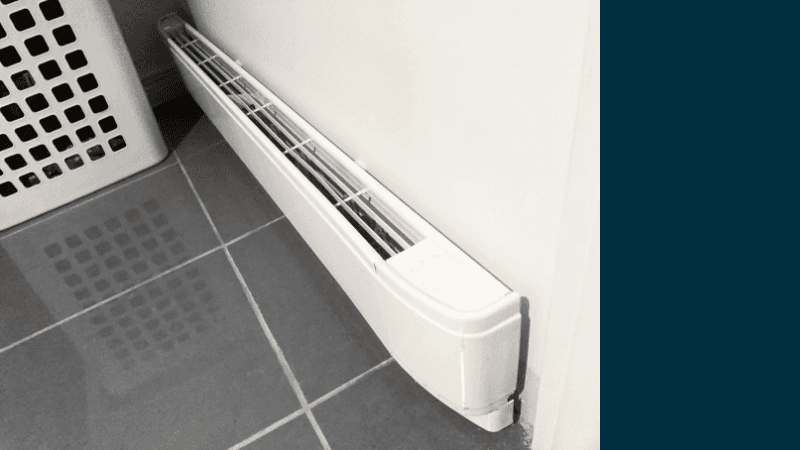Baseboard heaters: are they worth it?

Baseboard heaters have been in use for more than 70 years. Today’s options are notably more appealing, but are baseboard heaters good at warming your home?
Electric baseboard heaters run quietly and effectively while heating cool spots in your home. Installation is straightforward and sometimes DIYable.
Consider baseboard heater pricing, pros and cons, and how the heaters work to make the best choice for your home.
What is a baseboard heater?
A baseboard heater is a long rectangular heating element installed at floor level – typically over or above the baseboard trim.
Old-fashioned baseboard heaters circulate water or oil heated by a boiler through the home to heat it. Today’s electric baseboard heaters contain an internal heating element that creates heat and releases it to warm the room.
Electric baseboard heaters are usually hardwired into the home. However, some electric baseboard heaters are portable and can be plugged into a standard electrical outlet.
Where do baseboard heaters work best?
Electric baseboard heating can be hot to the touch, so it has limited practical applications.
We don’t recommend electric baseboard heating if you:
- Have small children
- Have pets
- Need to place furniture against the wall where it’s installed
- Have long draperies on the wall where it’s installed
- Have electrical outlets above the area where it’s installed
Electric baseboard heating requires a mostly empty wall. You should not place anything within 12 inches in front of the heater or 6 inches to the side of the heater.
We suggest using electric baseboard heaters like space heaters. They work well to heat a singular room but are not the ideal solution for whole-home heating.
Electric baseboard heaters are well-suited for home additions or spaces that aren’t adequately heated by your existing heating system. A garage workshop or bump-out bonus room are great places to install an electric baseboard heater.
Baseboard heater buying guide
When shopping for a baseboard heater, consider the following factors:
| 📏 Size | Your baseboard heater should fit the length of your wall. Most range 30-96” long. |
| 🛋️ Placement | You need the area around the heater to be free of furniture and outlets. If you don’t have a spot where this is possible, choose another type of heater. |
| ⚡ Output | The heating output of electric baseboard heaters is measured in watts. To figure out the wattage you need, multiply the square footage of the room you wish to heat by 10. You may need more or less wattage depending on the room’s ceiling height and the quality of its insulation. |
| 🔌 Power source | You may be able to plug a 120V baseboard heater into an electrical outlet. However, we recommend you have your baseboard heater professionally hardwired to a dedicated circuit in your electrical system. 240V baseboard heaters require hardwiring in the U.S. |
| 🌡️ Temperature control | Some baseboard heaters have a built-in thermostat. Others come with a remote control. Make sure the temperature control on the unit you purchase meets your needs. |
Baseboard heater costs
Baseboard heating generally costs between $25 and 250. They are available via online retailers like Amazon. You can also find them in home improvement stores like Home Depot and Lowe’s.
Some baseboard heaters plug directly into a standard electrical outlet. These types of heaters do not require professional installation.
We recommend having other types of baseboard heaters professionally installed to ensure they’re wired correctly. On average, plan for heating and cooling work to run about $150 per hour.
Baseboard heater pros and cons
Is electric baseboard heating a fit for your home? Explore the benefits and drawbacks below.
✅ Pros of electric baseboard heaters
- Low upfront investment
- Straightforward installation
- Electric heating is more sustainable
- Good option for heating a room
❌ Cons of electric baseboard heaters
- Hot to the touch, so unacceptable for homes with small children or pets
- Requires a large empty wall
- Less energy efficient than alternative heating methods
- Can only heat (no cooling capability)
We think electric baseboard heaters are a decent option for warming a home addition or a room that your furnace doesn’t keep warm. However, we suggest you install them in low-traffic areas of your home, free of kids, pets, furniture, and decor.
If baseboard heaters don’t seem to match your lifestyle, consider a ductless mini split instead. These systems are energy-efficient, plus they can heat and cool.